Unit 10 You're supposed to shake hands. Period 3 (Section A Grammar Focus-Section B 1d)课件(共17张PPT)
文档属性
| 名称 | Unit 10 You're supposed to shake hands. Period 3 (Section A Grammar Focus-Section B 1d)课件(共17张PPT) | 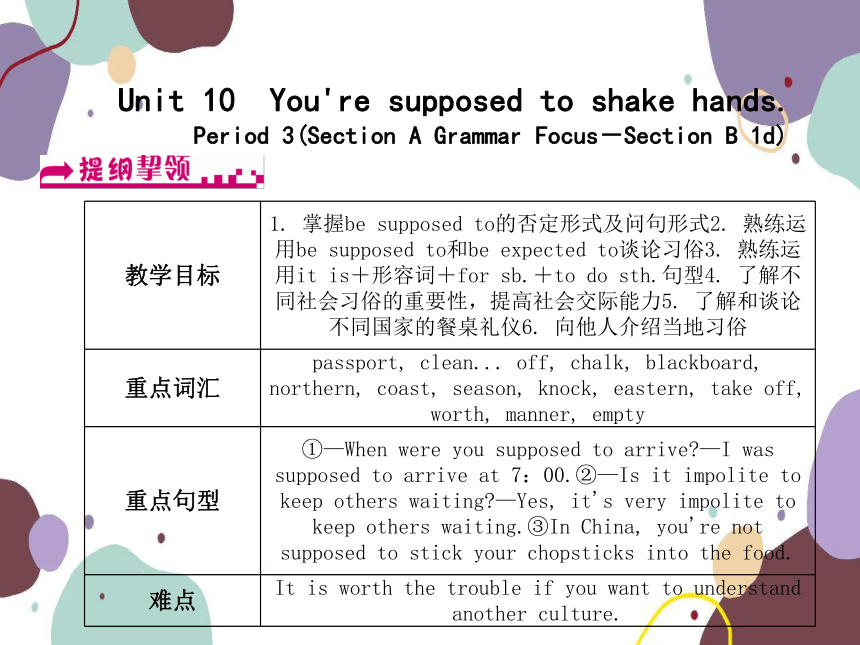 | |
| 格式 | pptx | ||
| 文件大小 | 233.2KB | ||
| 资源类型 | 教案 | ||
| 版本资源 | 人教新目标(Go for it)版 | ||
| 科目 | 英语 | ||
| 更新时间 | 2022-10-14 21:48:13 | ||
图片预览


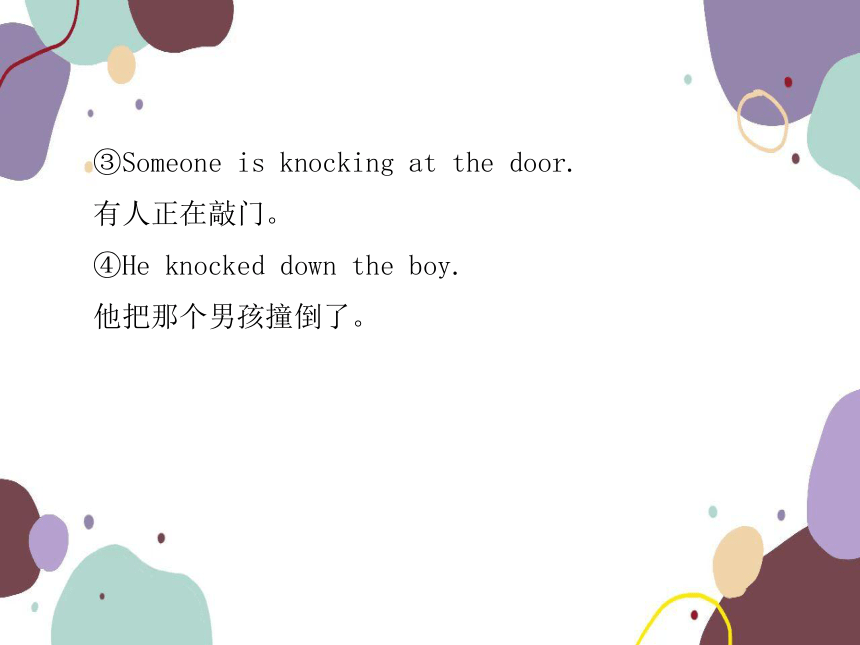
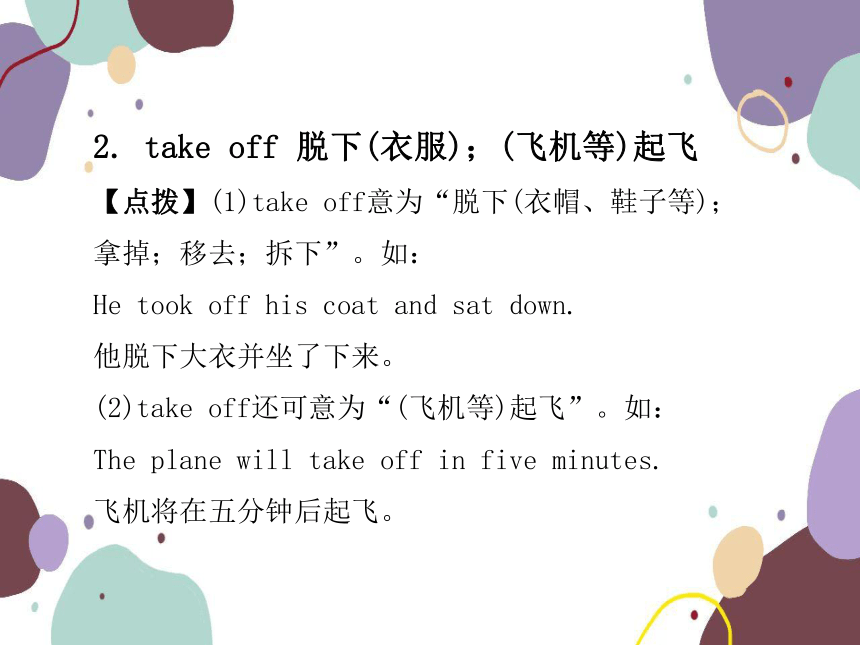
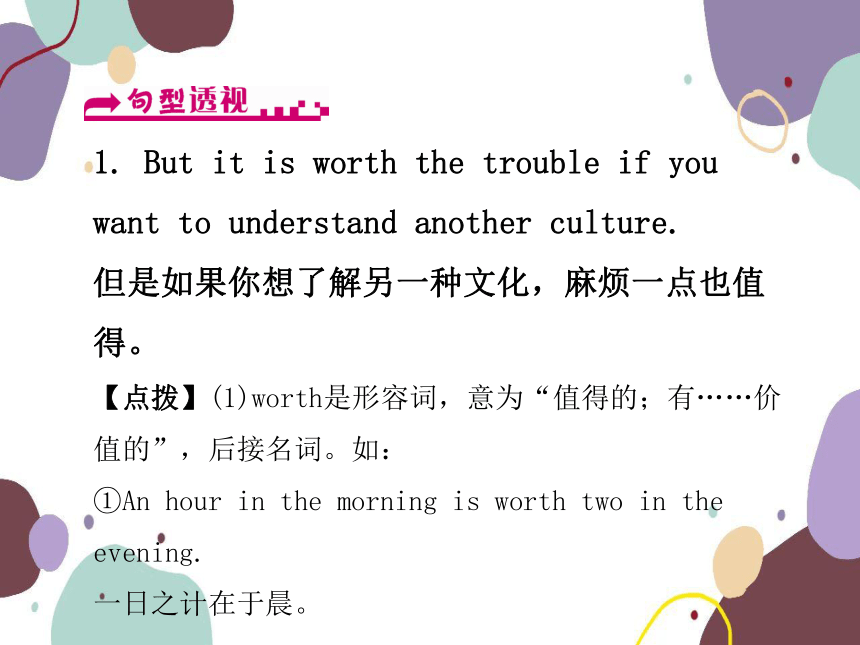
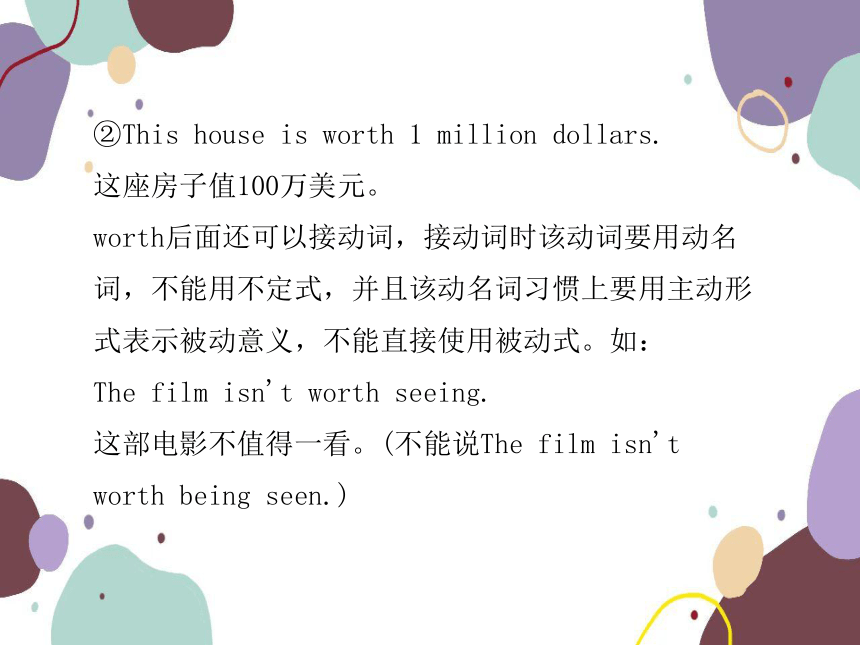
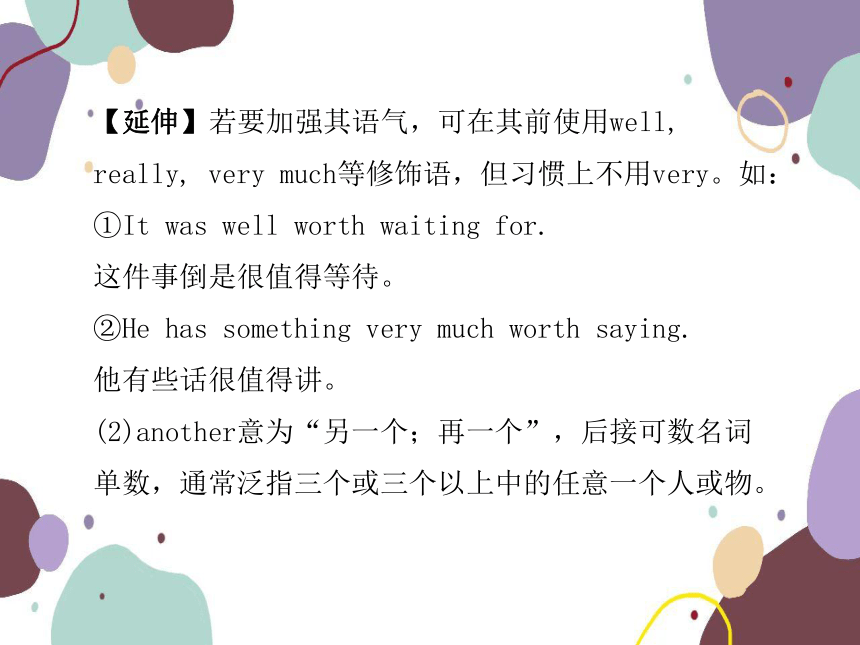
文档简介
(共17张PPT)
Unit 10 You're supposed to shake hands.
Period 3(Section A Grammar Focus-Section B 1d)
教学目标 1. 掌握be supposed to的否定形式及问句形式2. 熟练运用be supposed to和be expected to谈论习俗3. 熟练运用it is+形容词+for sb.+to do sth.句型4. 了解不同社会习俗的重要性,提高社会交际能力5. 了解和谈论不同国家的餐桌礼仪6. 向他人介绍当地习俗
重点词汇 passport, clean... off, chalk, blackboard, northern, coast, season, knock, eastern, take off, worth, manner, empty
重点句型 ①—When were you supposed to arrive —I was supposed to arrive at 7:00.②—Is it impolite to keep others waiting —Yes, it's very impolite to keep others waiting.③In China, you're not supposed to stick your chopsticks into the food.
难点 It is worth the trouble if you want to understand another culture.
1. knock敲;击;碰撞
【点拨】knock作动词时,意为“敲;击;碰撞”。常用短语:knock into意为“与……相撞”。knock还可作名词,意为“敲击;打”。如:
①The car knocked into the tree last night.
那辆小汽车昨天夜里撞到了树上。
②He got a knock on the head when he fell.
他跌倒时,撞到了头。
③Someone is knocking at the door.
有人正在敲门。
④He knocked down the boy.
他把那个男孩撞倒了。
2. take off 脱下(衣服);(飞机等)起飞
【点拨】(1)take off意为“脱下(衣帽、鞋子等);拿掉;移去;拆下”。如:
He took off his coat and sat down.
他脱下大衣并坐了下来。
(2)take off还可意为“(飞机等)起飞”。如:
The plane will take off in five minutes.
飞机将在五分钟后起飞。
1. But it is worth the trouble if you want to understand another culture.
但是如果你想了解另一种文化,麻烦一点也值得。
【点拨】(1)worth是形容词,意为“值得的;有……价值的”,后接名词。如:
①An hour in the morning is worth two in the evening.
一日之计在于晨。
②This house is worth 1 million dollars.
这座房子值100万美元。
worth后面还可以接动词,接动词时该动词要用动名词,不能用不定式,并且该动名词习惯上要用主动形式表示被动意义,不能直接使用被动式。如:
The film isn't worth seeing.
这部电影不值得一看。(不能说The film isn't worth being seen.)
【延伸】若要加强其语气,可在其前使用well, really, very much等修饰语,但习惯上不用very。如:
①It was well worth waiting for.
这件事倒是很值得等待。
②He has something very much worth saying.
他有些话很值得讲。
(2)another意为“另一个;再一个”,后接可数名词单数,通常泛指三个或三个以上中的任意一个人或物。
如:①Would you like another cup of tea
你要再来一杯茶吗?
②This pair of shoes is too small for me. Please show me another pair.
这双鞋我穿太小了。请再给我拿一双。
【延伸】another+数词+名词(复数)=数词+more+名词(复数),意为“再来……个……”。如:
We need another five desks.=We need five more desks.
我们还需要5张课桌。
【辨析】another, the other, other, others与the others
(1)another泛指三个或三个以上中的“另一个”,后接单数可数名词,也可用作代词;the other指两个之中的“另一个”,是特指。常用在one... the other...结构中,表示“一个……,另一个……”;other意为“别的;其他的”,其后常接复数名词;others用作代词,泛指“其他的人或物”,相当于other+复数名词。
(2)some... others...意为“有的……,有的……”;the others特指一个整体内的“其他全部的人或物”,相当于the other+复数名词。如:
①We need another chair.
我们还需要一把椅子。
②I don't like this skirt. Please show me another.
我不喜欢这条裙子。请给我另一条。
③He has two sisters. One is Lily and the other is Lisa. 他有两个姐姐。一个叫莉莉,另一个叫莉萨。
④You should think of others.
你应该为他人着想。
⑤The students are doing the cleaning. Some are cleaning the windows, and others are wiping the floor. 学生们正在打扫卫生。有的在擦窗户,有的在拖地板。
⑥There are fifty students in our class. Thirty of us are boys, and the others are girls.
我们班有50名学生。30名是男生,其余是女生。
2. In China, it's impolite to use your chopsticks to hit an empty bowl.
在中国,用筷子敲击空碗是不礼貌的。
【点拨】(1)empty作形容词时,意为“空的”,反义词为full(满的);作动词时,意为“排空;倒出”,反义词为fill(装满;填满)。如:
Just now he emptied the bottle. Now the bottle is empty.
刚才他把瓶子倒空了。现在瓶子是空的。
(2)it's impolite to do sth.意为“做某事是不礼貌的”,impolite可用rude代替。如:
It's impolite/rude to talk loudly in public.
在公共场所大声说话是不礼貌的。
【延伸】It+be+形容词(+of/for sb.)+to do sth.意为“(对某人来说)做某事是……的/(某人)做某事是……的”。此句型中,it为形式主语,动词不定式短语在句中作真正的主语。其用法如下:
(1)如果句中形容词描述的是动词不定式的动作,如easy, hard, difficult, interesting, impossible等形容词,则形容词后常用for。如:
①It isn't easy for me to learn English well.
学好英语对我来说不容易。
②It's hard for you to do so.
这样做对你来说很难。
(2)如果句中形容词描述的是人的感情或态度,如good, kind, nice, clever, foolish, right等形容词,则形容词后用of。如:
It is very kind of you to help me.
你能帮我真是太好了。
3. You shouldn't point at anyone with your chopsticks.
你不应该用你的筷子指任何人。
【点拨】point作不及物动词时,直接跟介词at来表示“指向”,也可以用point to表达。但二者的用法有区别:point at侧重表示指向距离较近的事物,at是介词,着重于指的对象;point to则侧重表示指向距离较远的事物,to是介词,着重于指的方向。如:
①Mary pointed at the clothes and asked me to try them on.
玛丽指了指衣服,让我试穿。
②The policeman pointed to the north and told me the way to the station.
警察指了指北方,告诉我去车站的路。
【延伸】point作名词时有多种含义,可意为“要点;分数;尖;尖端”等。如:
①Please look at these points.
请看这些要点。
②Do you have a pencil with a sharper point
你有削得更尖点儿的铅笔吗?
Unit 10 You're supposed to shake hands.
Period 3(Section A Grammar Focus-Section B 1d)
教学目标 1. 掌握be supposed to的否定形式及问句形式2. 熟练运用be supposed to和be expected to谈论习俗3. 熟练运用it is+形容词+for sb.+to do sth.句型4. 了解不同社会习俗的重要性,提高社会交际能力5. 了解和谈论不同国家的餐桌礼仪6. 向他人介绍当地习俗
重点词汇 passport, clean... off, chalk, blackboard, northern, coast, season, knock, eastern, take off, worth, manner, empty
重点句型 ①—When were you supposed to arrive —I was supposed to arrive at 7:00.②—Is it impolite to keep others waiting —Yes, it's very impolite to keep others waiting.③In China, you're not supposed to stick your chopsticks into the food.
难点 It is worth the trouble if you want to understand another culture.
1. knock敲;击;碰撞
【点拨】knock作动词时,意为“敲;击;碰撞”。常用短语:knock into意为“与……相撞”。knock还可作名词,意为“敲击;打”。如:
①The car knocked into the tree last night.
那辆小汽车昨天夜里撞到了树上。
②He got a knock on the head when he fell.
他跌倒时,撞到了头。
③Someone is knocking at the door.
有人正在敲门。
④He knocked down the boy.
他把那个男孩撞倒了。
2. take off 脱下(衣服);(飞机等)起飞
【点拨】(1)take off意为“脱下(衣帽、鞋子等);拿掉;移去;拆下”。如:
He took off his coat and sat down.
他脱下大衣并坐了下来。
(2)take off还可意为“(飞机等)起飞”。如:
The plane will take off in five minutes.
飞机将在五分钟后起飞。
1. But it is worth the trouble if you want to understand another culture.
但是如果你想了解另一种文化,麻烦一点也值得。
【点拨】(1)worth是形容词,意为“值得的;有……价值的”,后接名词。如:
①An hour in the morning is worth two in the evening.
一日之计在于晨。
②This house is worth 1 million dollars.
这座房子值100万美元。
worth后面还可以接动词,接动词时该动词要用动名词,不能用不定式,并且该动名词习惯上要用主动形式表示被动意义,不能直接使用被动式。如:
The film isn't worth seeing.
这部电影不值得一看。(不能说The film isn't worth being seen.)
【延伸】若要加强其语气,可在其前使用well, really, very much等修饰语,但习惯上不用very。如:
①It was well worth waiting for.
这件事倒是很值得等待。
②He has something very much worth saying.
他有些话很值得讲。
(2)another意为“另一个;再一个”,后接可数名词单数,通常泛指三个或三个以上中的任意一个人或物。
如:①Would you like another cup of tea
你要再来一杯茶吗?
②This pair of shoes is too small for me. Please show me another pair.
这双鞋我穿太小了。请再给我拿一双。
【延伸】another+数词+名词(复数)=数词+more+名词(复数),意为“再来……个……”。如:
We need another five desks.=We need five more desks.
我们还需要5张课桌。
【辨析】another, the other, other, others与the others
(1)another泛指三个或三个以上中的“另一个”,后接单数可数名词,也可用作代词;the other指两个之中的“另一个”,是特指。常用在one... the other...结构中,表示“一个……,另一个……”;other意为“别的;其他的”,其后常接复数名词;others用作代词,泛指“其他的人或物”,相当于other+复数名词。
(2)some... others...意为“有的……,有的……”;the others特指一个整体内的“其他全部的人或物”,相当于the other+复数名词。如:
①We need another chair.
我们还需要一把椅子。
②I don't like this skirt. Please show me another.
我不喜欢这条裙子。请给我另一条。
③He has two sisters. One is Lily and the other is Lisa. 他有两个姐姐。一个叫莉莉,另一个叫莉萨。
④You should think of others.
你应该为他人着想。
⑤The students are doing the cleaning. Some are cleaning the windows, and others are wiping the floor. 学生们正在打扫卫生。有的在擦窗户,有的在拖地板。
⑥There are fifty students in our class. Thirty of us are boys, and the others are girls.
我们班有50名学生。30名是男生,其余是女生。
2. In China, it's impolite to use your chopsticks to hit an empty bowl.
在中国,用筷子敲击空碗是不礼貌的。
【点拨】(1)empty作形容词时,意为“空的”,反义词为full(满的);作动词时,意为“排空;倒出”,反义词为fill(装满;填满)。如:
Just now he emptied the bottle. Now the bottle is empty.
刚才他把瓶子倒空了。现在瓶子是空的。
(2)it's impolite to do sth.意为“做某事是不礼貌的”,impolite可用rude代替。如:
It's impolite/rude to talk loudly in public.
在公共场所大声说话是不礼貌的。
【延伸】It+be+形容词(+of/for sb.)+to do sth.意为“(对某人来说)做某事是……的/(某人)做某事是……的”。此句型中,it为形式主语,动词不定式短语在句中作真正的主语。其用法如下:
(1)如果句中形容词描述的是动词不定式的动作,如easy, hard, difficult, interesting, impossible等形容词,则形容词后常用for。如:
①It isn't easy for me to learn English well.
学好英语对我来说不容易。
②It's hard for you to do so.
这样做对你来说很难。
(2)如果句中形容词描述的是人的感情或态度,如good, kind, nice, clever, foolish, right等形容词,则形容词后用of。如:
It is very kind of you to help me.
你能帮我真是太好了。
3. You shouldn't point at anyone with your chopsticks.
你不应该用你的筷子指任何人。
【点拨】point作不及物动词时,直接跟介词at来表示“指向”,也可以用point to表达。但二者的用法有区别:point at侧重表示指向距离较近的事物,at是介词,着重于指的对象;point to则侧重表示指向距离较远的事物,to是介词,着重于指的方向。如:
①Mary pointed at the clothes and asked me to try them on.
玛丽指了指衣服,让我试穿。
②The policeman pointed to the north and told me the way to the station.
警察指了指北方,告诉我去车站的路。
【延伸】point作名词时有多种含义,可意为“要点;分数;尖;尖端”等。如:
①Please look at these points.
请看这些要点。
②Do you have a pencil with a sharper point
你有削得更尖点儿的铅笔吗?
同课章节目录
- Unit 1 How can we become good learners.
- Section A
- Section B
- Unit 2 I think that mooncakes are delicious!
- Section A
- Section B
- Unit 3 Could you please tell me where the restroom
- Section A
- Section B
- Unit 4 I used to be afraid of the dark.
- Section A
- Section B
- Unit 5 What are the shirts made of?
- Section A
- Section B
- Review of Units 1-5
- Unit 6 When was it invented?
- Section A
- Section B
- Unit 7 Teenagers should be allowed to choose their
- Section A
- Section B
- Unit 8 It must belong to Carla.
- Section A
- Section B
- Unit 9 I like music that I can dance to.
- Section A
- Section B
- Unit 10 You're supposed to shake hands.
- Section A
- Section B
- Review of Units 6-10
- Unit 11 Sad movies make me cry.
- Section A
- Section B
- Unit 12 Life is full of the unexpected
- Section A
- Section B
- Unit 13 We're trying to save the earth!
- Section A
- Section B
- Unit 14 I remember meeting all of you in Grade 7.
- Section A
- Section B
- Review of Units 11-14
